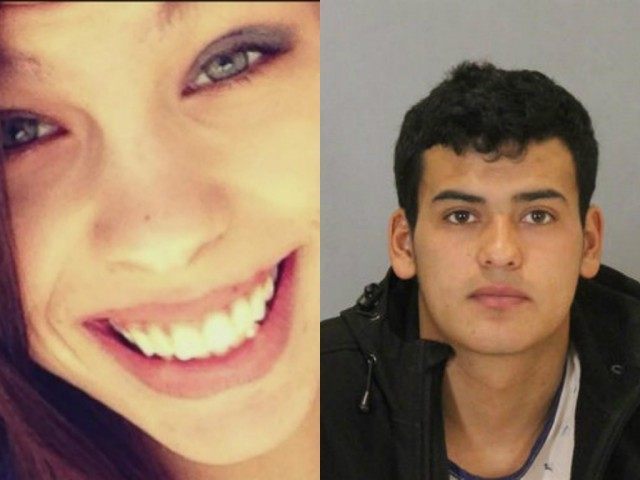More information has emerged on just how an illegal immigrant, who killed a Nebraska woman in a drunk driving incident, was allowed to get out of jail and skip town and future punishment.
Omaha police charged illegal alien Eswin Mejia with killing 21-year-old Sarah Root while driving drunk and street-racing the night of January 31, but in short order Mejia vanished after posting a small bond, skipping out on future court dates and being held accountable for killing the young woman.
Sadly, the day before the crash, Root graduated from Bellvue University with a 4.0 GPA and a B.S. in crime investigation. A GoFundMe campaign has been set up to help her family as they mourn her loss.
Before he absconded, police had asked U.S. Immigrations and Customs Enforcement (ICE) officials to detain Mejia. ICE officials, however, decided to deny the request for an immigration detainer, saying the suspect didn’t meet their requirements for a hold.
As ICE spokesman Shawn Neudauer explained to Breitbart News:
At the time of his January 2016 arrest in Omaha on local criminal charges, Eswin Mejia, 19, of Honduras, did not meet ICE’s enforcement priorities, as stated by the Nov. 20, 2014 civil enforcement memo issued by Secretary Johnson, because he had no prior significant misdemeanor or felony conviction record. As such, ICE did not lodge a detainer. Mejia is scheduled to go before an immigration judge on March 23, 2017, and it will be up to the immigration courts under the Department of Justice’s Executive Office for Immigration Review (EOIR) to determine whether he has a legal basis to remain in the U.S.
Without a federal hold on the suspect, judge Jeffrey Marcuzzo set the suspect’s bond at a low $5,000. Mejia promptly disappeared as soon as he left the court that day.
“My daughter’s life accounts for more than freakin’ $5,000 to bail him out,” the victim’s mother, Michelle Root, said at the time.
So, why was Mejia given such lenient treatment? It appears he shouldn’t, as the suspect had a long history of brushes with the law, not to mention his immigration status that was never brought up in court.
It turns out there were many reasons for a hold. Not only was Mejia an illegal alien, but he was a flight risk because he had a history of skipping out on other charges. In fact, the court never even heard Mejia was an illegal immigrant, nor did it hear of his history with the law.
But there is failure all over this case. Not only did the prosecution never offer the suspect’s immigration status or past failures to appear in front of a judge, the judge also never asked for such information. Further, not only did the prosecution not ask for a higher bond despite what it knew, the judge didn’t ask the prosecution what recommendations it might have.
Everyone just pushed the suspect’s case through in a matter of minutes and moved on.
Seeming to admit there are problems communicating such things in these cases, Douglas County attorney Don Kleine told KETV Channel 7 it could all have been handled better.
“We’ve talked about that, how we handle that even if the judge doesn’t ask us, if we should interject, or we should be involved more,” Kleine told the news station. “So he thought he had laid out the facts enough that the judge knew how serious this was, that the judge would set a higher bond, but he didn’t.”
Worse, Douglass County, in which Omaha resides, is a so-called sanctuary for illegal immigrants, and it appears judges aren’t even allowed to ask these questions.
According to KETV, a spokesman from the Nebraska State Court, judges cannot even ask such questions about suspects.
According to judges, they do not get any paperwork from pretrial release, rather simply a score. “The score encompasses a number of things. Judges have no way of knowing if there were previous failures to appear unless the prosecutor mentions it during the hearing. I am not sure it is appropriate to address Mejia’s legal status when he was in front of the judge at the bond hearing. It wasn’t an issue. The issue was whether or not he was drinking, not whether or not he was a U.S. Citizen, which makes it hard to address. A judge can’t ask a defendant their immigration status or assume anything from their appearance.”
It appears the whole system was rigged to give Mejia lenient treatment, to disallow pertinent information about his immigration status and his criminal past, and to allow him all the leeway possible to skip town once freed.
Follow Warner Todd Huston on Twitter @warnerthuston, or email the author at igcolonel@hotmail.com.

COMMENTS
Please let us know if you're having issues with commenting.